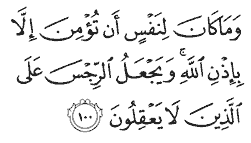Intellectual Faculties, Among People, Shariah and Freedom
Issue 634 » May 20, 2011 - Jumada Al-Thani 17, 1432
Living The Quran
Intellectual Faculties
Yunus (Jonah) - Chapter 10: Verse 100
 "And it is not for a soul to believe except by permission of God , and He will place defilement upon those who will not use reason."
"And it is not for a soul to believe except by permission of God , and He will place defilement upon those who will not use reason."
All of God's bounties are solely at His disposal and one can neither have access to any of these without His leave, nor can one confer them on others. The bounty of having faith and being directed to the right path is also fully contingent upon God's leave which is based on whether or not people's intellectual faculties are alive. Those who do not use their intellectual faculties or those who use them in improper ways, are devoid of God's leave to believe.
The Quran attaches great importance to the intellectual activities or faculties, all of which it relates to the "heart;" these faculties are reflection, using reason, considering, knowledge, insight, "hearing," etc. It regards anyone who is devoid of these as being dead. Even if we relate all these to the heart, or each to a different faculty, the way to keep these alive is to refrain from being pre-conditioned, and to avoid prejudices, incorrect viewpoints, evil intentions, sins, wrongdoing, arrogance, and selfishness. These are the vices which prevent one from believing.
Compiled From:
"The Quran: Annotated Interpretation in Modern English" - Ali Unal, pp. 444
"Towards Understanding the Quran" - Syed Abul Ala Maududi, Vol. 4, p. 69
Understanding The Prophet's Life
Among People
The Prophet, peace be upon him, never regarded himself as greater than anybody else. Only his radiant face and attractive person distinguished him from his Companions. He lived and dressed like the poorest people and sat and ate with them, just as he did with slaves and servants. Once a woman saw him eating and remarked: "He eats like a slave." The Messenger replied: "Could there be a better slave than me? I am a slave of God." [Haythami]
One time when he was serving his friends, a bedouin came in and shouted: "Who is the master of this people?" The Messenger answered in such a way that he introduced himself while expressing a substantial principle of Islamic leadership and public administration: "The people's master is the one who serves them." Ali says that among people the Messenger was one of them. When he and Abu Bakr reached Quba while emigrating to Madina, some Madinese who did not know what the Prophet looked like tried to kiss Abu Bakr's hands. The only external sign distinguishing one man from the other was that Abu Bakr seemed older than the Messenger. [Ibn Hisham]
Compiled From:
"The Messenger of God: Muhammad" - Fethullah Gulen, p. 298
Blindspot!
Shariah and Freedom
In its fullest sense, the Shariah is virtually synonymous, and can be used interchangeably, with the word Din, which can only inadequately be translated as 'religion'. Din literally means 'way of life', 'submission', 'following' or the 'Way'. Though the word Shariah in its various derivative forms is found in five places in the Quran, its extensive use only came into vogue much later; for the words Islam and Din were more commonly employed to express the same meaning in the early days of Islam.
The Shariah includes both faith and practice. It embraces worship, individual attitude and conduct as well as social norms and laws, whether political, economic, familial, criminal or civil.
It may also sometimes be used to imply, in a more restricted sense, do's and don'ts- the rules and regulations for conduct and behaviour. Lastly, it is also used as the equivalent of the Islamic laws.
The Shariah is thus nothing less than the divinely ordained way of life for man. To realise the divine will, man must follow the Shariah. To live in Islam is to live according to the Shariah. To give up the Shariah or any part of it knowingly, wilfully or deliberately is to give up Islam. A Muslim must therefore do his utmost to observe and to implement the whole of it, wherever and in whatever situation he finds himself. Hence the Muslim insistence, persistence, commitment and passion for it.
The act of total submission to God in accordance with the Shariah given by Him in no way diminishes human dignity, freedom and responsibility. The act of submission is the highest act of human volition and freedom, for it implies freedom to disobey God. Indeed, in submitting to God, all the chains and shackles of every form of serfdom, servility and bondage are broken, whether they be to other men, to ideas, to nature, to man- made objects or to institutions. For before the affirmation of One God must come the forsaking of every false god.
More importantly, total submission to God elevates man to the state of Khilafa, (vicegerency), whereby he is accorded the highest place on earth by being endowed with reason, articulation, volition, freedom and responsibility. The responsibility to follow the Shariah according to the Qur'an (33: 72), is the fulfilment of amanah, the trust which even the heavens, the earth and the mountains dare not bear.
Compiled From:
Islam: The Way of Revival, "The Shariah - Islamic Law" - Khurram Murad, p. 189